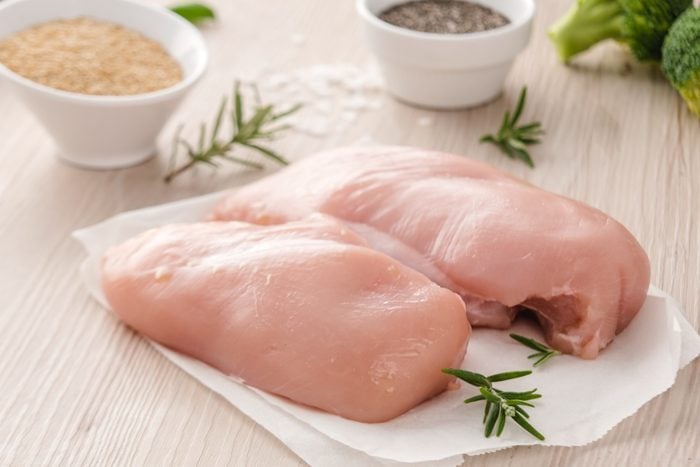Are You Supposed to Wash Chicken?
Updated: Apr. 06, 2023

Are you supposed to wash chicken? This polarizing poultry problem finally has a clear answer.
It’s been debated among professional chefs and home cooks alike—should you wash your chicken before cooking it? Food health and safety professionals advise against this practice, as it can increase the spread of bacteria and the risk of cross contamination.
Let’s dive in and learn how to avoid this common food safety mistake.
Are You Supposed to Wash Chicken?
No, you are not supposed to wash raw chicken. The United States Department of Agriculture (USDA) advises against washing chicken because it increases the risk of being exposed to dangerous bacteria.
In the past, some people washed their chicken as a way to get rid of harmful bacteria before cooking it. Unfortunately, washing or rinsing raw chicken does not get rid of bacteria. In fact, it increases the chances of bacteria being spread to other surfaces and utensils in the kitchen.
A USDA study found that among people who wash their chicken, about one in seven of them still had bacteria in their sinks even after washing the sink.
Why Washing Chicken Is Unnecessary
Washing chicken is unnecessary because it does not remove bacteria or lower the risk of foodborne illness. It is possible for chicken to contain Campylobacter, Salmonella, and Clostridium perfringens bacteria. These types of bacteria can lead to serious foodborne illness.
The Centers for Disease Control and Prevention (CDC) estimate that up to 1 million people in the United States get sick from eating poultry each year. According to the CDC, Salmonella causes more foodborne illnesses in the United States than any other type of bacteria. It’s estimated that about 1 in every 25 packages of chicken in grocery stores is contaminated with Salmonella.
When you handle raw chicken in your kitchen sink, it is possible for the juices to spread to other surfaces and foods. When rinsing raw chicken, water may splash and cause bacteria to spread.
Here’s a list of other foods you should never wash before cooking.
How to Handle Chicken Safely
While it’s common for raw chicken to contain bacteria, it is possible to safely enjoy poultry with a few simple steps.
How to Store Chicken
It’s important to keep raw chicken in the refrigerator or freezer to prevent the growth of bacteria. Wrap the package in a plastic bag to prevent any juices from leaking out and touching other food.
Make sure your refrigerator temperature is set to 40°F or colder and your freezer to 0° or colder. Raw chicken kept in the refrigerator should be used within two days of purchase.
Here are more tips for how to store raw chicken.
How to Use Prepared Chicken
One of our favorite weeknight dinner hacks is to grab a cooked rotisserie chicken at the grocery store. If you purchased your cooked chicken while it’s hot, make sure to refrigerate it within two hours. If you have leftovers, pull the pieces of chicken off the bone and store them in a covered container for up to four days.
How to Thaw Chicken
If you’re planning to use frozen chicken for dinner this week, it’s important to plan ahead.
There are three ways to safely thaw frozen chicken:
-
Place in the refrigerator for one to two days.
-
If the chicken is contained in an airtight, leak-proof package, place it in a large pot of cold water to thaw. Make sure to change the water every 30 minutes to keep it cold.
-
Thaw chicken in the microwave. Because the microwaving process can partially cook the chicken, you will need to cook it right away.
Once the chicken has been thawed, plan to use it within two days.
How to Cook Chicken
Chicken is one of the most versatile proteins out there, and we love trying new chicken recipes as often as we can. To cook raw chicken, try baking it in the oven, sauteeing it on the stove or tossing it in the slow cooker after browning. (Never use the slow cooker for frozen chicken because bacteria could develop as raw chicken sits in it.) Chicken should be cooked to an internal temperature of 165°. The temperature of cooked chicken ensures that all of the potential bacteria have been destroyed.
Always wash your hands for 20 seconds before and after handling raw chicken, and use separate cutting boards and utensils when preparing dinner with raw meats.
Bottom Line
Chicken is a healthy and versatile protein that makes dinnertime a breeze. To save time and stay healthy, don’t wash or rinse raw chicken. To avoid raw chicken cooking mistakes, store it in a sealed bag and keep it refrigerated or frozen until ready to use.
